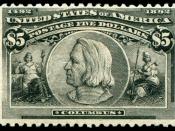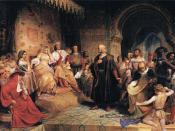Many people today think of Christopher Columbus as a an imperialist. The issue of Columbus has two sides, the good and the immortality. There was some evidence found that supports this. In the book Taking Sides, Kirkpatrick Sale supports the side of Columbus being an imperialist. While Robert Royal views him as not being an imperialist. After reading "Taking Sides", my opinion on Christopher Columbus has changed. In my opinion, Columbus is an imperialist.
According to Sale, he feels that Columbus invaded the land and the people from which he found. On behalf of the Spanish Monarchy, Columbus took possession of everything. Sale also believes that Columbus's main goal was to enslave the natives. Some examples of European Imperialism are exploitation of natural resources, religious conversion and settlement. Sale also states that Columbus wanted to conquer the new land and their people. "They ought to be good servants and of good intelligence...I
believe that they would easily be made Christians, because it seemed to me that they had no religion. Our Lord Pleasing, I will carry off six of them at my departure to Your Highness, in order that they may learn to speak."[pg.28]
According to Robert Royal, Columbus was not an imperialist. Royal feels that Columbus was doing just as he was ordered to by the king. Royal also states that Columbus was not motivated by European arrogance and avarice. He also feels that Columbus also enjoyed the gold while exploring. Royal says Columbus should be praised for his courage and willingness to explore the unknown, and for his success in advancing knowledge about other parts of the world. Royal also says that the only reason Columbus kidnapped the Indians was because he was hoping the Indians would tell others of Spain's wonders and of Columbus' good intentions.


